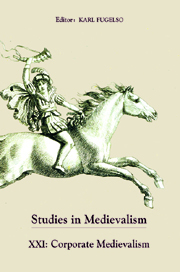Neomedievalism Unplugged
from III - Response
Published online by Cambridge University Press: 05 February 2013
Summary
In recent articles discussing definitions of medievalism(s) and neomedievalism(s), several themes seem to reoccur; one of those themes is the question of the validity of such scholarship. Karl Fugelso, in his Editorial Note to Studies in Medievalism XX, notes that some medievalists consider neomedievalism to be “defending artificial borders that diminish medievalism without establishing valid alternatives” while others question the “validity of neomedievalism.” Whether neomedievalism is a subset of medievalism or something distinctive is still a matter of lively discussion; we hope to further that discussion by addressing four themes that have emerged in recent volumes of Studies in Medievalism and elsewhere. First is the pedagogical use to which we, as academics, put medievalism, including neomedievalism. Second is the effect upon tenure and promotion for those publishing in neomedievalism. Third is a concern over identifying and defining both medievalism and neomedievalism. Finally, there is a question as to further theoretical possibilities.
It is widely acknowledged that medievalism and neomedievalism have had an effect on medievalists' pedagogy. Almost all of us who teach undergraduate medieval studies slip in an occasional film clip or “modernization,” either for comic relief or to advance critical thinking and understanding of the cultural production of images, both in our own time and historically. One could call these overlapping purposes enlivening, enrollment, and enlightening. There is no need to elaborate on enlivening: students respond to references they are familiar with, and we often use those references as scaffold to the less familiar, often difficult work of our courses.
- Type
- Chapter
- Information
- Studies in Medievalism XXICorporate Medievalism, pp. 191 - 206Publisher: Boydell & BrewerPrint publication year: 2012



